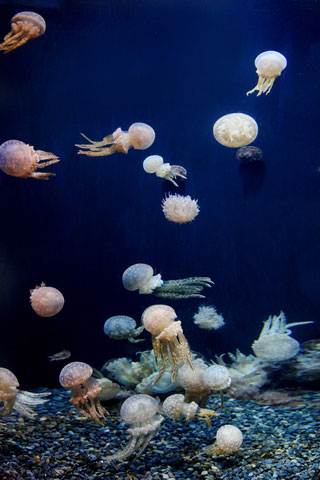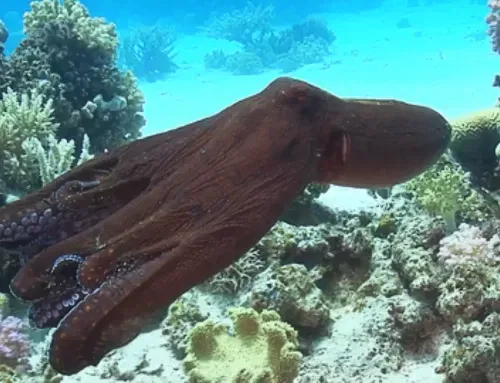
‘Like messengers rising from the depths, they propelled themselves through the water effortlessly.’
Many years ago I asked my father after I heard him play the Dvorak cello concerto if he ever got bored playing the same composition so often.
“No,” he said, “because every time I play it, I learn something new. It’s never exactly the same.”
And so it was for me at a recent talk on my novel, Jellyfish Have Eyes, at the Selby Library in Sarasota, Florida.
As always while preparing for a lecture, whether on science or my novel, I focused on what aspects to stress and how to organize the presentation. But, I found, as has often been the case when I give a lecture on a topic that I’d presented numerous times, a fresh look provided new perspectives. Although fiction, Jellyfish Have Eyes draws from my own experiences as a research scientist collecting jellyfish to investigate their eyes. I revised the novel so many times I couldn’t imagine there was a new way to think about it. I was wrong.
I knew well the major themes I covered in my talk: A well-intentioned government with values we all uphold could become suppressive, especially of creativity, if they assume the moral compass of the nation; The importance of fulfilling a dream – exploring the unknown without a specific, practical objective in mind; The conflict between a basic scientist’s impulse and rationality; and finally, The notion that science is not just a barrel of facts, but linked observations that tell a story that is never complete. Then there are the subplots: for example, the role of happenstance in shaping destiny, and the tensions between family, colleagues and ambition, that I didn’t speak about. So what did I learn by giving this lecture?
Upon rereading a passage I’d labored over, I suddenly realized that jellyfish are, partly, a metaphor for life in the novel, an idea adding depth to the story. In retrospect, I believe considering jellyfish a metaphor lurked in the back of my mind when I wrote the book, but I hadn’t recognized its importance. The passage reads as follows:
“Finally, Ricardo succumbed to sleep. He dreamed of the mysterious jellyfish by the dock. Like messengers rising from the depths, they propelled themselves through the water effortlessly. He heard them saying, “We are alive.” It was as if they were heading to a known destination, yet drifting at the same time. They were impossible to grasp and slipped through his fingers when he reached out to touch them. More groups of jellyfish streamed into his dream. They pulsed in synchrony as if linked, yet each was an individual, alone, like him. A few jellyfish were large – adults; others were small – like children. They dissolved and reformed, over and over again, dissolving and reforming, merging and separating.”
We are all born and are alive without making a personal effort (not true for our mother!); we’re just here. And, who hasn’t wanted to reach a destination or achieve a goal, yet felt drifting and unable to reach that goal, or who hasn’t felt part of a group, yet alone, insignificant, or who hasn’t felt like an adult in control, yet also like a dependent child at the same time or at other times, or who hasn’t dissolved emotionally and then regrouped, pulled together, over and over again?
The jellyfish in Ricardo’s dream were a metaphor for his life.
And then there were questions from the audience. Most were straightforward for me to answer, such as how do jellyfish reproduce, and then, what differences did I find between editorial comments on my science writing and my fiction? I’ll refrain from digressing to discuss these here.
After the lecture a gentleman with an impressive gray beard, who waited patiently as I signed a few books, said, “You know everything you mentioned about jellyfish over 200 million years ago is nonsense.” (I had spoken briefly about evolution and said that jellyfish were present on the planet 7-800 million years ago, while we humans were relative newcomers.) I was, and still am, baffled why he chose 200 million years as the threshold for knowledge. However, he continued and asked, “How did everything around us come about?” Again, I didn’t know how to answer him. Fortunately he answered his own question: “Everything seen is made by the hand unseen.”
My lecture on Jellyfish Have Eyes, written with the themes I mentioned above in mind, took me to religion, which I hadn’t considered for a moment.
I asked him whether he was familiar with genetics and mutation, and he said no. I had to admit that I was equally unfamiliar with the Bible. He and I lived in a world apart, yet he bothered to come to my lecture. We were talking about the same novel and seeing it with different eyes. Public exposure is more than sharing information, it’s sharpening the mind, disciplining thoughts, and a road to unexpected insights.
He left, saying, “Well, at least I learned that jellyfish have eyes.”
This short exchange with a stranger made me aware of the vast difference between writing science for the choir and writing fiction for everyone. Fiction covers so much breadth and contradictions to consider.
Thus, the lecture on my novel put me unexpectedly in an arena far larger than the story I told. If nothing else, this experience provides a clear example that our knowledge pales in comparison with the subjects we touch upon, leaving no room for boredom or conceit.






Interesting! Glad he was relatively polite and not actively boycotting the lecture!
Yes, he was polite and didn’t seem argumentative. I guess that’s what happens when you’re sure you’re right!